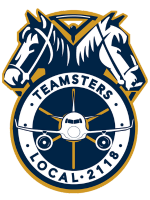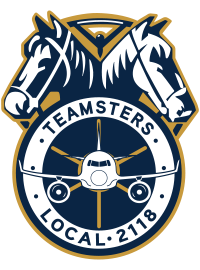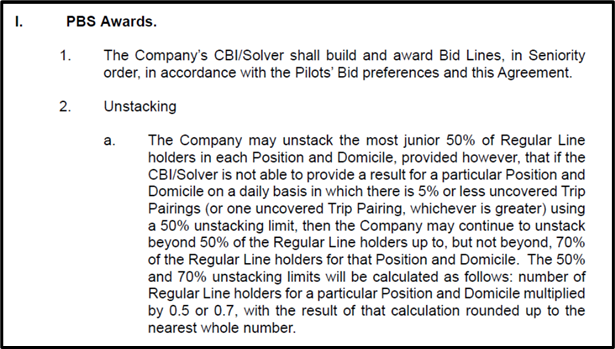Negotiating Committee – April 21, 2025
| Reorganizing for Strength! | |||||||||||||||||||||||||||||||||||
 |
|||||||||||||||||||||||||||||||||||
| Fellow Pilots:
Happy Easter to All Who Celebrate We hope that our fellow pilots and your families had a great Easter weekend. We know this holiday comes at a frustrating time for many as our work for a fair contract and successful, cooperative future at Allegiant continues. Even still, we hope you were able to step back this past weekend and spend meaningful time with loved ones. Regardless of the noise, we should all remember to appreciate the quiet moments—they’re what we’re ultimately fighting to protect. We should all take time as often as we possibly can to remember what truly matters. Different Year, Same Story Management has a long history of attempting to undermine staffing and negotiations over scheduling. Using a data driven approach or empirical evidence has never been satisfactory to management when the numbers don’t support the Company’s demands, making it very difficult to reach an agreement on fair terms. If the Union provided any such evidence, Allegiant would try to discredit the results claiming that then current staffing is “not indicative” of the staffing levels of the future (read: they want less). Consider the following Union update from our second round of mediation over PBS in 2019:
After our last update, some pilots questioned whether Allegiant management had the willingness or operational capacity to significantly reduce headcount. While they may be coy about their intentions today, the Allegiant management of old was upfront about their intention to slash staffing to the minimum levels. They realized that through the natural efficiency of PBS and high levels of unstacking (ignoring your preferences), they could schedule pilots at their leisure and reduce headcount to levels significantly below any other major airline. Consider the following Union update from PBS mediation in 2018:
Even during our mediation in 2018, management wanted a 26% headcount reduction from already industry low staffing levels. For reference, even at our current, post-Bloch staffing level, we estimate Allegiant is over 20% less than comparable carriers. When you examine the numbers more closely on a block hour basis, Allegiant extracts 30+% greater block hour productivity per pilot in peak periods than the next nearest comparator on a relative basis based on publicly available data.
Example: Approximate Pilot Count Per Aircraft The Allegiant pilot always does more with less. In fact, it took almost 20 years for our pilots to secure even the most basic seniority protections, thanks in large part to Richard Bloch’s landmark arbitration decision. We have no intention of “forcing” the company to arbitrarily increase headcount. Our interest is in protecting what we have and what our pilots have fought for and rightfully earned through years of mediation, arbitration, and litigation. “Buying” Your Own Pay Raise After nearly four years of mediation, litigation, and arbitration, Arbitrator Richard Bloch delivered a landmark ruling in 2020 that finally ended years of scheduling contract violations and restored our seniority rights as guaranteed by the agreement that we negotiated. Unwilling to adhere to the clear, unambiguous language in our contract and the binding arbitration ruling, management resisted and filed suit in federal court to overturn the Bloch award. In 2022, their appeal was denied, and the threat of scheduling without regard for seniority or preferences was permanently put to bed – or so we thought. It has been made clear that the Allegiant pilots are expected to fund their own pay raises through concessionary scheduling “efficiencies”. These include a reversal of the Bloch award under CBI as well as the ability to ignore preferences for the majority of our pilots after PBS is implemented. The Allegiant pilots have made it clear that this is unacceptable. Retention Bonus Concerns Several pilots have expressed concern about the company’s intention or requirement to pay the retention bonus upon ratification of a contract or in the event of a strike. The Negotiating Committee will not use the retention bonus agreement as a negotiating device under any circumstance. As per the original agreement, pilots should expect that the entire retention bonus shall be paid within sixty (60) days of contract ratification. If we strike, do I lose my retention bonus? A legal strike has no effect on the retention bonus agreement. The Union will not entertain the elimination or reduction of the retention bonus agreement as a part of any return-to-work agreement negotiated with the company. The eligibility for bonus payment requirements are set forth in Paragraph 1.a. and 1.b of the Interim Agreement: a) you remain actively employed with the Company through the ratification date of the Parties’ amended CBA; or b) you retire from the Company’s employ due to reaching the FAA mandatory retirement age prior to the ratification date of the Parties’ amended CBA. A strike does not divest a pilot who satisfies the above criteria of their right to payment of their retention bonus. Management cannot suggest, infer, or explicitly state that they will refuse to honor the terms of your retention bonus payment in the event of a legal strike. If you have been a part of any such discussion with management, report it immediately to negotiations@apa2118.org. General Bargaining Updates Last week, we formally submitted a request for a proffer of arbitration and status meeting request from the National Mediation Board (NMB). In response, the NMB requested that Allegiant provide their comments no later than 29 April 2025. Allegiant requested a 2-week extension from the board so that they can “adequately respond to the Union’s assertions and provide the Board with the full context of the parties’ bargaining.” The request was granted and the deadline for management to provide their comments regarding our proffer was extended to May 13, 2025. The Negotiating Committee had a virtual meeting with the mediator on Friday, April 18th, 2025. The parties are scheduled to meet for a joint mediation next week on Thursday, April 24th, 2025. We will keep you updated regarding any further developments. Protect and Enforce – Understanding Contract Language The goal of your Negotiating Committee is simple, enforceable contract language. Our pilots frequently assume contract provisions are clear—until weak or ambiguous wording is used against them. If it’s not enforceable, it is exploitable. Consider the Company’s proposed unstacking language:
Example: Excerpt from company email to pilots on December 18th In December, the management publicly shared details of its above-quoted unstacking proposal in PBS. They characterized their proposal as having “50/70% unstacking limits” and strongly suggested that these limits were confined to “peak vs. non-peak” respectively. The truth is that this language had no requirement to prove necessity for 70%, no limit on frequency, and no mechanism for the union to review or challenge that justification. There isn’t a fixed limit or peak vs. non-peak provision. This language is wide open and easily exploited to the detriment of your seniority and quality of life. You may have already noticed the following: “Unable to Provide a Result” Clause = Full Management Discretion The statement “if the CBI/Solver is not able to provide a result” is ambiguous enough to be interpreted broadly and without limitation. “Solver Failure” immediately triggers higher unstacking, even if such a failure is the result of solver manipulation (as was past practice), artificial constraints, poor company planning, and/or unrealistic scheduling/staffing assumptions. Normalizing 70% and the “Single Trip” Clause If the “solver fails” on just one single day across a bid period, 70% unstacking is triggered. Even if there are just two “uncovered trip” on any given day, a virtual certainty if any open time is allowed to exist, then the company can ignore the preferences of 70% of line holders. For reference, 12 of our 22 bases had at least 2 uncovered trips on any given day in March 2025. Even the most minor staffing inefficiency or intentional over-scheduling triggers the limit to 70%. In short, there is no 50% limit, nor any “peak vs. non-peak” limitations in this language. It is at least 70% in virtually all cases. 70% – A Soft Limit Another unique “feature” of this language is the so-called “unstacking limit”. By definition, a limit is not to be exceeded. The language appears to clearly express a hard limit, then in the very next clause builds in a way to bypass it. The language states: “…up to, but not beyond, 70% of the regular line holders…” Then the “funny math”: “…70% unstacking limit will be calculated as follows…multiplied by 0.7…rounded up…” If you need extra math to calculate an already mathematically defined limit, it is simply a loophole disguised as a rule. Committee Changes We welcome Captain Brad Keller to the Negotiating Committee. Captain Keller is a Line Check Airman, serves as a Steward and SPC Representative for Local 2118, and is the current chairman of the G4 Pilot Assistance Fund, LLC. Captain Keller is a former United States Marine, and has been in the airline industry since 2007. Allegiant is his 5th Airline and this will be his 4th contract. We look forward to his line oriented insight and operational experience as we intensify our efforts to reach a fair agreement at the earliest possible opportunity. Although management has informed the Union that they intend to reject his addition to the committee, the Union intends to challenge this decision. In Closing We are especially grateful for the many messages of support and encouragement we received over the last several days. Your Negotiating Committee is a team of your peers and we remain committed to delivering a fair contract that we can all be proud of. We continue to work tirelessly toward that goal, and we appreciate your engagement, your questions, your trust, and your support. Thank you for continuing to hold management accountable for the contract they promised you. We look forward to delivering an agreement worthy of your vote in the very near future. PBS Decision Documents 240529_9th Circuit (PBS Decision)
Captain Joshua Allen Captain Jay Killen Captain Brad Keller Captain J.R. Lynch Captain Jim Cole
|
|||||||||||||||||||||||||||||||||||
 |
|||||||||||||||||||||||||||||||||||
|
Copyright (C) 2025 Allegiant Pilots Association, Teamsters Local Union 2118. All rights reserved. You are receiving this email as a member of APA Teamsters Local 2118. |

